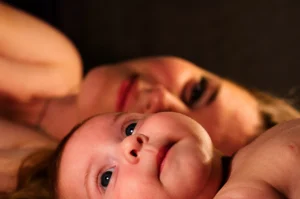There isn’t a single parent in the world whose baby hasn’t experienced sleep regression. We all know a parent (or have been the parent) who has desperately turned to google to try to figure out why it is happening, when will it end and when to anticipate it being an issue again.
Let’s dive into what sleep regressions are and what you can do to help this unpleasant experience not be so unpleasant.
SLEEP REGRESSIONS – WHAT ARE THEY?
The Oxford Dictionary defines regression as “a return to a former or less developed state.”
Typically when we think of a sleep regression in regard to a child, we think of a child who was falling asleep easily and remaining asleep, no longer doing so. Beyond the four month sleep regression, regressions don’t really apply to sleep. They are associated with developmental leaps, walking talking, crawling etc. For the sake of simplicity though, we can refer to these leaps as regressions.
Sleep regressions are completely normal and part of every child’s development. Each child’s development is unique to them. This causes every child’s sleep regression to occur at different times (outside of the four month regression) and for different reasons. There is no age at which regressions occur for all children.
It is important to remember that every kid has the occasional night of unusual sleep. This would not be considered a regression. A regression would be reoccurring interrupted sleep over a prolonged period of time. This can be over several days or even weeks. It is also important to remember that if you child has never really slept well, they aren’t going through a “regression.” They are experiencing sleep issues.
The three most common reasons for sleep regressions are:
- Illness
- A shift in schedule
- Development
SLEEP AND DEVELOPMENT HAVE AN AFFECT ON EACHOTHER:
Babies are hard at work all day every day. The amount of new information they process throughout their day is enormous. They are constantly being exposed to new sounds, sights, tastes, and are being physically challenged. They are learning how to use their fingers, roll over, crawl, stand, walk, the list could go on and on. All of these new experiences can lead to excitement that may make it hard to fall asleep and stay asleep. Think about being so excited for an upcoming vacation or fun event that you can’t sleep. This is similar to what a baby may feel, excitement to continue experiencing all the new things in life.
There are general trends to when baby milestones may occur. Typically, sleep regressions happen in coordination with when these developmental milestones occur. This doesn’t mean that sleep regression is on a predictable schedule (think set dates like 6 months, 9 months, a year). It is more of an effect of what stage the child is at in their personal development. Often you will see this regression in sleep about a week before the development takes place.
HANDLING SLEEP REGRESSIONS:
You can always reach out to us for guidance on your specific situation and struggles. Every child is unique in their development and sleep journey and it is important to remember that.
Here are some basic pointers while going through these challenging phases:
- Stay calm and know that this phase is just that, a phase. It is not permanent.
- Help your little one throughout the day. The sooner they master whatever new skill they are working on, the sooner it will stop keeping them up at night.
- Don’t rush to them if they move or make sounds in their crib. Give them time to try to soothe themselves back to sleep. You will become familiar with your baby’s noises and body language and will get better at knowing when they truly need you. If they are sitting or standing up in their crib, give them time to figure out how to lay back down. As long as they are safe and they aren’t distraught, they will learn how to get themselves back into a comfortable sleeping position.
- Try to avoid over-helping your baby fall back asleep. This can create a habit that your baby will then expect like falling asleep in your arms while you are singing. While those moments are special, they are not sustainable in the long run if your baby begins to depend on it to fall asleep.
- Ask for help if you need it! There is absolutely no shame in reaching out for help. Parents are typically tired during sleep regressions because their sleep is also affected. Tired parents do not perform at their full capacity. Help yourself be the best parent you can be by getting help if you need it.
We are here to guide you towards setting up boundaries that promote healthy sleeping habits. Your baby needs quality sleep so that they are ready for their next big day of learning and exploring. You need sleep so that you can take on whatever the day might present and so that you can be the engaged parent you want to be. Baby sleep patterns will have its peaks and valleys but we are here to close the gap in any way that we can.





